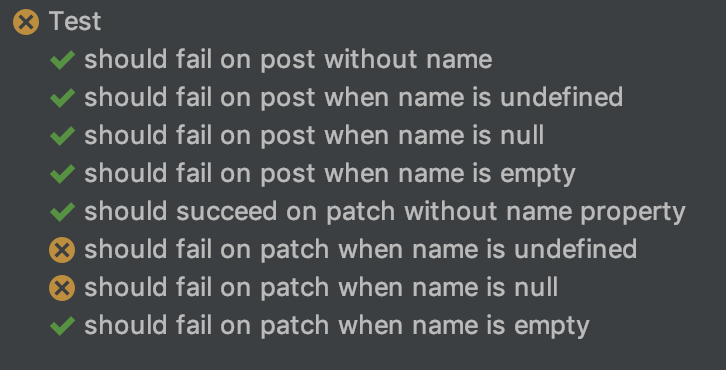feat: @IsOptional should works only for undefined values
See original GitHub issueThis code:
import { IsNotEmpty, IsOptional, IsString, validate } from 'class-validator';
import { plainToClass } from 'class-transformer';
const PATCH = 'patch';
const POST = 'post';
export class Test {
@IsOptional({ groups: [PATCH] })
@IsNotEmpty({ always: true })
@IsString()
name: string;
}
async function getValidationErrors(obj, group) {
return await validate(plainToClass(Test, obj), { groups: [group] });
}
describe('Test', () => {
it('should fail on post without name', async () => {
const errors = await getValidationErrors({}, POST);
expect(errors).not.toEqual([]);
});
it('should fail on post when name is undefined', async () => {
const errors = await getValidationErrors({ name: undefined }, POST);
expect(errors).not.toEqual([]);
});
it('should fail on post when name is null', async () => {
const errors = await getValidationErrors({ name: null }, POST);
expect(errors).not.toEqual([]);
});
it('should fail on post when name is empty', async () => {
const errors = await getValidationErrors({ name: '' }, POST);
expect(errors).not.toEqual([]);
});
it('should succeed on patch without name property', async () => {
const errors = await getValidationErrors({}, PATCH);
expect(errors).toEqual([]);
});
it('should fail on patch when name is undefined', async () => {
const errors = await getValidationErrors({ name: undefined }, PATCH);
expect(errors).not.toEqual([]);
});
it('should fail on patch when name is null', async () => {
const errors = await getValidationErrors({ name: null }, PATCH);
expect(errors).not.toEqual([]);
});
it('should fail on patch when name is empty', async () => {
const errors = await getValidationErrors({ name: '' }, PATCH);
expect(errors).not.toEqual([]);
});
});
gives the following results:
 Am I missing something here?
Am I missing something here?
Looking at the code of @IsOptional I see that it checks that the property is not undefined or null, that’s why the test for empty string is not failing, but in theory shouldn’t it check that this property exists on the object?
Issue Analytics
- State:
- Created 4 years ago
- Reactions:19
- Comments:12 (5 by maintainers)
 Top Results From Across the Web
Top Results From Across the Web
class validator - How to allow null, but forbid undefined?
It turns out that this is possible by using conditional validation ValidateIf : class DbRow { @IsNumber() id!: number; ...
Read more >Java - Null Handling With Optionals | by Ömer Kurular - Medium
If no value exists inside Optional object, then this method will throw NoSuchElementException. So, we can use it as follows or just use...
Read more >How to Deal with Optional Things and "Undefined" in TypeScript
Working with JavaScript means working with undefined . It's a standard way to say, ... You must tell TypeScript if a property is...
Read more >If nulls are evil, what should be used when a value can be ...
Lots of things are better to return than null. An empty string (""); An empty collection; An "optional" or "maybe" monad; A function...
Read more >Is 'optional<list>' bad practice in Java? - Quora
A list containing no values is, by definition, empty. You could make a case for distinguishing an empty list from a missing list...
Read more > Top Related Medium Post
Top Related Medium Post
No results found
 Top Related StackOverflow Question
Top Related StackOverflow Question
No results found
 Troubleshoot Live Code
Troubleshoot Live Code
Lightrun enables developers to add logs, metrics and snapshots to live code - no restarts or redeploys required.
Start Free Top Related Reddit Thread
Top Related Reddit Thread
No results found
 Top Related Hackernoon Post
Top Related Hackernoon Post
No results found
 Top Related Tweet
Top Related Tweet
No results found
 Top Related Dev.to Post
Top Related Dev.to Post
No results found
 Top Related Hashnode Post
Top Related Hashnode Post
No results found

@vlapo How about something like an extra config option? The implementation I’ve got in my fork doesn’t break backwards compatibility (as the option defaults to
true, which is the default behaviour):The commit on the fork that adds this behaviour: https://github.com/se-internal/class-validator/commit/5ac9fa0c17ad43ecb0e8642675447b380a54139e